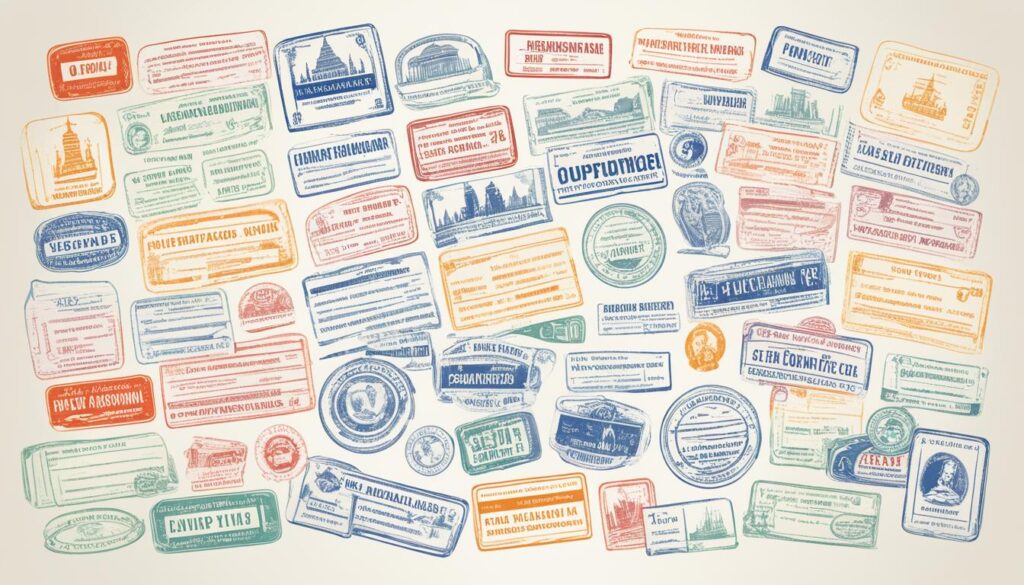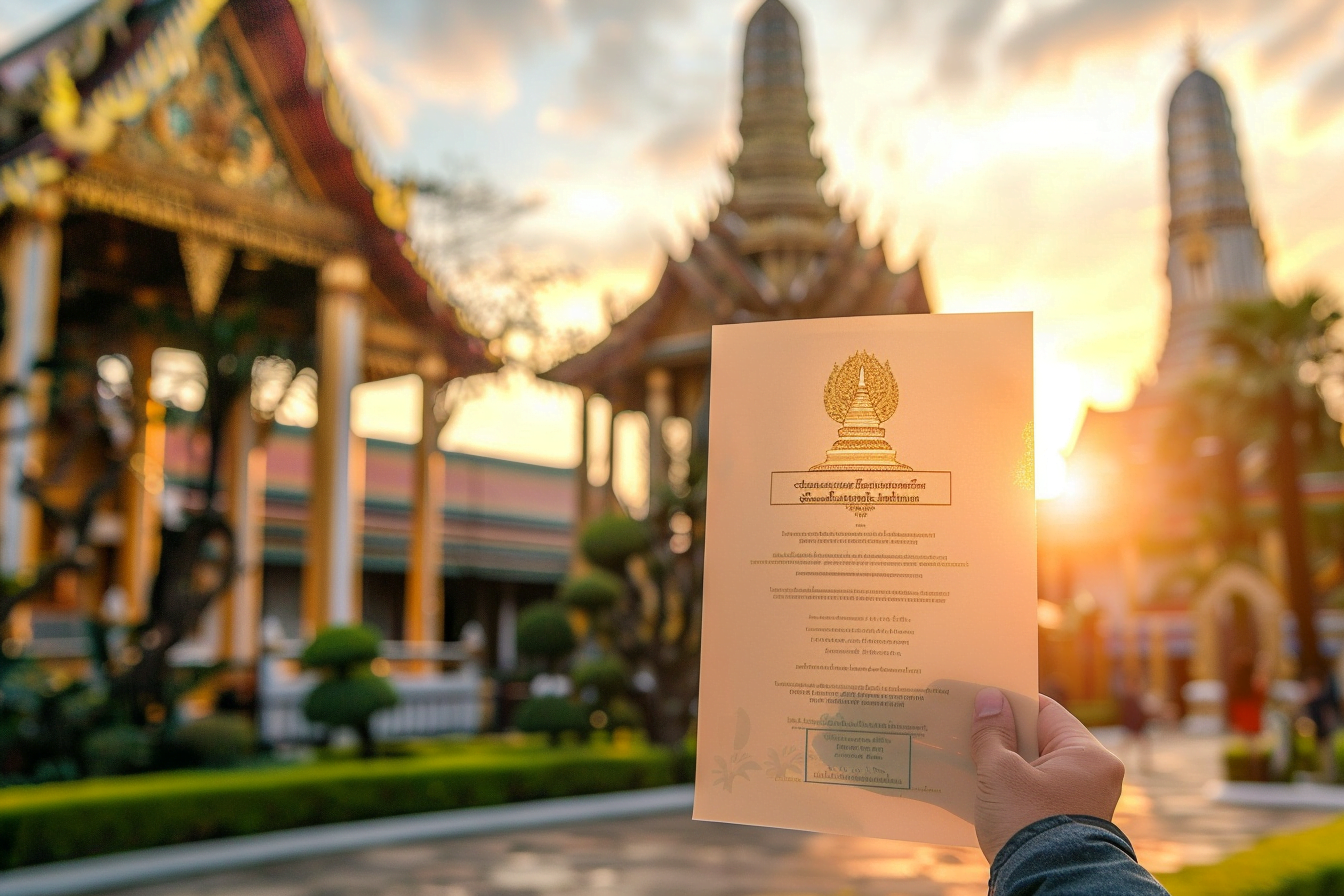Unlock the essentials of securing a work permit for foreign nationals in Thailand with our comprehensive guide and expert tips.
In a striking revelation, Thailand’s Ministry of Labour reported a surge in Thailand work permit fees over recent years—a testament to the country’s burgeoning appeal as a business and expatriate haven. This economic allure draws countless foreign nationals to navigate the complex corridors of the Thai work permit application process annually, with an eye firmly on legal compliance and the countless opportunities that Thailand offers. Whether you’re seeking initial entry or gearing up for a work permit renewal in Thailand, a deep understanding of procedural nuances is vital for a seamless integration into the Thai workforce.
Key Takeaways
- The importance of procuring a legitimate work permit for foreign nationals in Thailand cannot be overstated—a measure that ensures legality and benefits in the workforce.
- Navigating the Thai work permit application process requires awareness of visa types prior to entry, followed by local permit acquisition.
- Understanding the intricacies of Thailand work permit fees and the spectrum of documentation needed is crucial for budgeting and planning.
- Staying legally employed implicates periodic work permit renewal in Thailand, ensuring uninterrupted work and residence.
- Appreciating the distinction between a work visa and a work permit lays the groundwork for compliance with Thai regulations.
Understanding the Thai Work Visa and Work Permit
The path to work authorization in Thailand involves navigating through a framework of Thai work permit regulations. Foreign nationals eyeing the vibrant Thai job market must discern the critical differences between a Thailand work visa and a work permit. A work visa, notably the Non-Immigrant B visa, provides entry into the country—contingent on future employment or business engagement—while the work permit is the official document granting a foreigner the right to work or engage in business once in Thailand.
Securing a Thailand work visa initiates the process, a prerequisite that is fulfilled outside the country, through a Thai embassy or consulate. Upon arrival with an approved work visa, the foreign national can then apply for a work permit, ideally in collaboration with a Thai employer who follows the local hiring mandates. It’s important to recognize that these legal documents are tethered to specific jobs and employers, any deviation from which could result in steep penalties under Thai law.
Understanding the nuances between these two important documents is vital for those seeking to live and work legally in Thailand. Let’s delve deeper into the specific characteristics that distinguish them:
- Thailand Work Visa: Issued by Thai embassies; necessary for entry into Thailand with the intent to seek employment or conduct business.
- Work Permit: Issued by Thailand’s Ministry of Labor; legal authorization to work within Thailand, specifying the holder’s occupation and employer.
Compliance with these regulations is not merely a formality but a comprehensive legal requirement. Post-acquisition of these documents, workers are able to confidently navigate Thailand’s dynamic business landscape, assured in their legal status within the Kingdom.
Moreover, the interplay between obtaining a work visa and the corresponding work permit mirrors a broader commitment to upholding the integrity of Thailand’s labor laws—ensuring that all foreign workers are contributing to the country’s economy in a lawful manner.
Types of Non-Immigrant Visas for Work in Thailand
Thailand offers an array of visa options catering to foreign professionals with varying roles and requirements. From business executives to media representatives, each visa type provides a tailored entry path, acting as a precursor to the Thai work permit application process. Understanding these options is fundamental for securing a foreign worker permit in Thailand. Below is an exploration of the different Non-Immigrant visas available and the unique benefits of the Smart Visa Thailand program.

Non-Immigrant B Visa (Business Visa)
Designed for business professionals and employees, the Non-Immigrant B Visa is often the first step for those intending to work in Thailand. This visa can be extended upon issuance of a work permit, aligning with the necessities of a work-centric stay in the Kingdom.
Non-Immigrant B-A Visa (Business Approved Visa)
The B-A Visa streamlines the process for foreign investors, through expedited processing by the Thai enterprises they are investing in, ensuring a smooth transition into the business landscape of Thailand.
Non-Immigrant IB Visa (Investment and Business Visa)
Those involved in investment projects or companies promoted by Thailand’s Board of Investment (BOI) can obtain the IB Visa, which is specifically configured to meet the needs of this elite group of investors and business specialists.
Non-Immigrant M Visa (Media Visa)
Media professionals may opt for the M Visa, which caters to the industry-specific requirements of journalists and media staff, necessitating additional authorizations to ensure compliance with Thailand’s regulatory framework.
Non-Immigrant O Visa (Accompanying Family Members)
Accommodating the family members of foreign workers, the O Visa helps in keeping loved ones together, providing a legal basis for family members to join the principal visa holder during their employment period in Thailand.
Smart Visa and Its Benefits
The Smart Visa is a revolutionary program for highly-skilled professionals, entrepreneurs, and tech-savvy individuals. It offers a plethora of advantages such as a 4-year residency period, without the traditional work permit requirements, enhancing its appeal for top-tier talent in designated “Smart” industries.
Eligibility and Requirements for a Work Permit for Foreign Nationals in Thailand
When considering a move to Thailand for work, expats are often concerned with the work permit requirements for expats in Thailand. To ensure a smooth Thai work permit application process, both the hiring company and the foreign applicant need to understand and fulfill specific criteria. It is vital to meet these eligibility requisites to secure legal employment in Thailand.
Companies based in Thailand that seek to employ foreign nationals must first adhere to the nation’s strict capital and employment ratios. This regulation requires one work permit for every 2 million THB of registered capital or for every four full-time Thai employees. Companies that qualify under the Board of Investment (BOI) have the advantage of exemptions but must provide justifiable reasons for employing foreign experts. On the other hand, expatriates need to possess a non-immigrant visa, have a job offer from a prospective Thai employer, and ensure their proposed occupation is not on the Foreign Business Act’s prohibited jobs list.
| Requirement | Details |
|---|---|
| Company Capital | 1 work permit for every 2 million THB of capital |
| Employment Ratio | 1 work permit for every 4 Thai employees |
| BOI Company Benefits | Exemptions available with proper justifications |
| Visa Type | Non-immigrant visa required before work permit application |
| Occupational Restrictions | Must not be on the Foreign Business Act’s prohibited list |
To commence the application process, thorough preparation of a comprehensive list of documents is required. For the company, this includes compiling evidence of company registration, shareholder lists, and financial statements. The expat applicant must provide educational certificates, a resume, and a valid passport, alongside other personal details.
Understanding these prerequisites and preparing the necessary paperwork in advance can greatly simplify obtaining a work permit. It’s an essential step towards a rewarding professional life in the Land of Smiles for expats globally.

Step-By-Step Application Process for Obtaining a Thai Work Permit
The journey to legally working in Thailand involves a methodical approach, beginning with the accurate assembly of documents and navigating through the Thai work permit application process. Understanding the necessary steps will simplify the complexity of the procedure and ensure compliance with Thai employment regulations.
Preparing Necessary Documents From Both Company and Employee
Every successful Thai work permit application starts with meticulous preparation of documentation. The employer is responsible for providing evidence of corporate legitimacy, such as business registration and tax compliance certificates. On the other hand, the foreign national must present personal credentials including a valid passport, educational certificates, and a non-immigrant visa. Both parties also need to complete the work permit application forms in Thailand, which serve as the backbone of the application file. To streamline the process, here is a checklist to facilitate the preparation:
- Completed work permit application forms
- Employer’s commercial registration documents
- Recent financial statements from the employer
- Employee’s passport with a valid non-immigrant visa stamp
- Degree certificates and transcripts
- Resume or CV detailing professional experience
Submitting the Work Permit Application to the Ministry of Labor
With all the pertinent documents in hand, the application dossier is ready for submission to the Ministry of Labor. This pivotal step can be facilitated by a visit to the ministry’s local office or through online channels where available. Employers or legal representatives can often spearhead this process, ensuring that all facets of the application meet the strict guidelines and standards set by Thai authorities.
Receiving Work Permit Approval and Collection Procedures
The anticipation culminates with the approval of the work permit. This process generally spans 7 to 10 business days. Approved applicants will receive a notification to collect their work permit. It’s crucial for employees to maintain an active non-immigrant visa status at this stage. Upon collection, the foreign national is officially recognized as a lawful employee in Thailand and can commence their professional endeavors.
Below is a table summarizing the actions taken after approval:
| Action | Details | Responsible Party |
|---|---|---|
| Notification | The ministry sends out an approval notice | Ministry of Labor |
| Collection of Work Permit | Physical presence required to collect the document | Applicant (Foreign Employee) |
| Maintaining Visa Status | Ensure that the non-immigrant visa is still valid | Applicant (Foreign Employee) |
| Commence Employment | Legal start to working in the designated position | Applicant (Foreign Employee) |
A smooth thai work permit application process relies on attention to detail, complete documentation, and adherence to the steps provided. With the work permit in hand, foreign nationals can confidently unlock the opportunities of the Thai job market.

Work Permit Regulations and Employee Obligations
When embarking on a professional journey in Thailand, foreign nationals who have obtained their work permit enter into a set of binding agreements as per Thai law. These regulations ensure that the individual’s employment is both legitimate and conducive to the country’s labor standards. Adhering to these requirements is crucial for maintaining lawful employment status and avoiding any potential legal issues that could disrupt one’s ability to work and remain in Thailand.
Scope of Work and Restrictions
The terms dictated in a Thai work permit are not just formalities but bind the foreign national to specific employment roles and organizations. The Thai work permit regulations firmly state that permit holders must commit only to the job function and employer mentioned in the permit. Diverging from these specifications can lead to severe consequences, including punitive fines and incarceration. Hence, it is paramount for foreign employees to operate strictly within the boundaries of their work permits to ensure continuous and trouble-free employment in Thailand.
Income Tax and 90-Day Reporting Requirements
Beyond adhering to work stipulations, individuals are obligated to remain in good standing with Thailand’s Revenue Department. This includes timely income tax filing and obtaining a tax ID, which is essential for any earning individual in the Kingdom. Furthermore, the requirements stretch into keeping their residency status updated through a 90-day reporting to the Thai immigration authorities. As part of the work permit renewal in Thailand, adherence to these rules is non-negotiable, promoting fiscal responsibility, and contributing to the structure that upholds the integrity of the Thai employment system.
FAQ
What is a work permit for foreign nationals in Thailand?
A work permit for foreign nationals in Thailand is a legal document that allows a non-Thai citizen to work in the country. It specifies the job description, employer, and location of work and is required for compliance with Thai employment laws.
How does the Thai work permit application process work?
The Thai work permit application process involves choosing the appropriate non-immigrant visa, gathering documentation from the employer and employee, submitting the application to the Ministry of Labor (or the BOI for eligible companies), and finally collecting the work permit upon approval.
What are the Thailand work permit fees?
Thailand work permit fees vary based on the type of permit, duration, and other factors. Generally, the fee could range from 1,000 to 3,000 THB for the initial application and similar amounts for annual renewals.
How do you renew a work permit in Thailand?
To renew a work permit in Thailand, you must submit a renewal application before the current permit expires. This involves providing updated documentation and paying the applicable fees. It’s important to not let your work permit lapse to avoid penalties.
What’s the difference between a work authorization in Thailand and a work permit?
A work authorization in Thailand refers generally to the legal right to work in the country, while a work permit is the specific document that formally grants this authorization under Thai law, detailing the employment conditions for a foreign national.
Are there different types of work visas in Thailand?
Yes, there are different types of work visas in Thailand, tailored to various employment situations such as business (Non-Immigrant B Visa), investment (Non-Immigrant IB Visa), media (Non-Immigrant M Visa), and family members of those with work visas (Non-Immigrant O Visa). The Smart Visa also caters to specific highly skilled professionals.
What are the eligibility criteria for obtaining a Thai work permit?
Eligibility for a Thai work permit includes having a valid non-immigrant visa, an employer in Thailand, and an occupation that is not restricted by the Foreign Business Act. The hiring company should also meet specific capital and Thai employee ratios unless exempted.
What documents are needed from both the company and the employee for the work permit application?
The company must provide documents such as company registration, shareholder lists, and financial statements. The employee should provide a valid passport, educational certificates, and any other qualifications relevant to the job role.
What is the process for submitting a work permit application in Thailand?
The work permit application is submitted after gathering all the required documents, filling out the applicable forms, and ensuring the initial non-immigrant visa is active. Applications are submitted to the Ministry of Labor or via the BOI system for eligible employments.
How long takes the work permit approval process?
The work permit approval process typically takes 7 to 10 business days. However, for qualified applicants through the BOI’s One-Stop Service Center, the process can be faster.
What are the scope of work and restrictions with a Thai work permit?
A Thai work permit outlines specific details about the job description, location, and employer. Foreign nationals are restricted to working within these parameters and taking up additional or different employment can result in legal repercussions.
What are the income tax and 90-day reporting requirements for work permit holders in Thailand?
Work permit holders in Thailand are required to file income tax returns and obtain a tax identification number. They are also required to report their address to the immigration authorities every 90 days, known as the 90-day reporting requirement.






Leave a reply